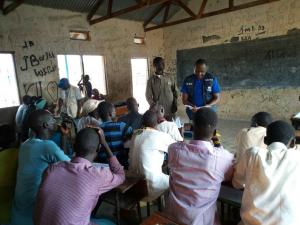Amid insecurity, WHO scaling up routine immunization coverage in South Sudan
Amid widespread conflict where over 1.9 million people displaced due to insecurity, ensuring all children receive life-saving vaccines can be a challenge.
To strengthen and increase routine immunization coverage in conflict affected areas, WHO conducted multiple service delivery activities including accelerated outreach, measles follow-up campaign and phase II of the meningitis campaign in the conflict affected states of Unity, Jonglei and Upper Nile to reduce the risk of vaccine preventable diseases including measles and meningitis outbreaks.
Though the third dose of Pentavalent vaccine coverage has increased marginally from 45% in 2016 to 57% in 2017 the coverage for areas seriously hit by the crisis has not changed significantly, remaining at 16% says Mr Kofi Boateng, the WHO Immunization Technical Officer. He also explained that while accelerated and hit as well as a run approaches are used, partners need to ensure presence of highly skilled staff in these areas to secure effective handling and use of the vaccine to make an impact.
Population displacements coupled with disrupted health service delivery indicated hundreds of thousands of the population are in dire need of innovative interventions to reduce risk of consequences of vaccine preventable disease, Mr Boateng emphasized.
Routine immunization in South Sudan is affected by multiple factors resulting in low coverage. Access to routine immunization services has been constrained by inadequate static sessions and lack of outreach sessions due to lack of appropriate planning for routine immunization in health facilities; low capacity of expanded programme on immunization (EPI) staff at state, county and facility level; Acute shortages of vaccinators at facility level; sub-optimal functioning of the cold chain system; inadequate data quality reporting among others.
“Immunization is one of the most effective interventions to prevent disease and early child death”, says Mr Evans Liyosi, WHO Representative a.i. to South Sudan. Intensifying efforts to accelerate and increase access to immunization services using several strategies and approaches is vital to save the lives of the vulnerable children in hard to reach areas.
In 2017, over 930 000 people were vaccinated through the innovative strategies such as periodic intensification routine immunization (PIRI), outreach campaigns and hit and run as well as supplementary immunization activities (SIAs) for measles and meningitis.



